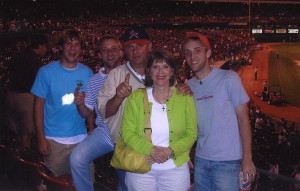 The year was 1986. Rockey Felker was just 33 years old when he became the youngest head football coach in the nation. He was living his dream coaching football at Mississippi State University, his alma mater and the place he absolutely loved better than most anyplace on earth —the place that felt like home. His plan was to raise his family there, to build the program, and retire when the time came. And even then, Starkville—and MSU—would continue to be home.
The year was 1986. Rockey Felker was just 33 years old when he became the youngest head football coach in the nation. He was living his dream coaching football at Mississippi State University, his alma mater and the place he absolutely loved better than most anyplace on earth —the place that felt like home. His plan was to raise his family there, to build the program, and retire when the time came. And even then, Starkville—and MSU—would continue to be home.
All of his memories there were good ones. In 1974, his senior year as quarterback, he had led the Bulldogs to a 9-3 overall record, leading the SEC in total offense, guiding his team to a victory in the Sun Bowl, and enjoying accolades as the SEC Player of the year and the Birmingham Post Herald’s Outstanding Senior Player. Aside from all that, Rockey was a guy with a strong commitment to the Lord. He was always open about his faith—not preachy or holier-than-thou—but just a “what-you-see-is-what-you- get” personality, notably steady and consistent. Whether he was on the field, in the locker room, or in church on Sunday mornings, Rockey was the same humble Rockey. And because of that, even those who did not bleed maroon and white had a certain affection and respect for Rockey Felker.
But in 1986, when the great desire of his heart to be a head coach in SEC football was granted, he inherited a program that was in bad shape. The Bulldogs had one outstanding quarterback and beyond that were in “rebuilding” mode. The challenges were big ones. In spite of the deficits—and there were many—the Bulldogs pulled out a 6-5 record that first year beating ranked teams like Tennessee and Syracuse. Optimism for the future was high, but maybe not so realistic.
When the next season began and the seniors of the previous year had departed, there was just no miracle waiting around the corner. That season and the next four were dismal. Recruiting was complicated by facilities that needed updating, and it was hard to attract the top prospects when the competition involved schools with gargantuan budgets for the football program. He was fired after the 1990 season.
And it hurt—a lot. It hurt so much that when Rockey and Susan packed up and left Starkville, Rockey cashed in his state retirement. If there was one thing he was sure of, it was this—he was not coming back to Mississippi State.
Redemption happens. God opens doors, changes hearts, and that old friend, TIME, can heal a lot of hurts. Such has certainly been the case for Rockey and Susan Felker. And the promise of Romans 8:28—that God does work all things for good in the lives of those who love Him—proved itself true again and again.
Five moves and 12 years later, the Felkers’ returned to MSU. Rockey accepted the administrative role as Coordinator of Football Operations. The greatest irony in his return was that Jackie Sherrill, the man who had been hired to replace him years earlier, was also the man who literally pursued him, cajoled him, and convinced him to come home.
Twelve years have passed. Rockey is still at MSU though his job description has been either tweaked or rewritten with each head coach change. Win or lose. Rockey is as MSU as “Bully” himself. When he is dubbed “the Ambassador of MSU,” there is much truth in the title. He can coach. He can recruit. He can talk to prospective players’ mamas (an art all its own). He can speak to civic clubs, churches, pro-scouts, or professors—just pick a venue. He is a master at building relationships because he genuinely likes people. When it comes to the players, he takes an interest in their lives beyond football.
Susan laughs telling the story of the day she was grabbing lunch in the Union and a football player came up to her and asked if she was Coach Rock’s wife. She replied that she was, and the young man said, “You know what we call Coach Rock? The godfather.”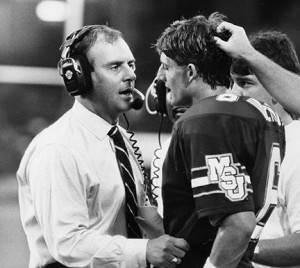
Rockey relishes his role and admits that he sleeps with his cell phone close by feeling a certain paternal responsibility to be on call all the time.
One of his former players tells me that Rockey’s coaching style was unique. He was not a screamer. Neither was he “soft.” He was care and concern and encouraging and warm, but he had a way of teaching personal toughness. And his faith always bled through.
Beginnings
Rockey grew up in Brownsville, Tennessee, the oldest of three sons born to Mary Jane and “Babe” Felker who coached football and girls’ basketball at the local high school. Athletics was big with the Felker boys. They played every sport, and Rockey lettered in five of them, but the family faith and the Brownsville Baptist Church had an even bigger stake than athletics on Rockey’s future.
He walked the aisle and made his profession of faith at eight years old. “I had already asked Jesus in to my heart…and, you know, that was a big part of my life. I always wanted to serve God.” It seems that Rockey understood at a very young age that life is not lived in “compartments,” but that for Believers, everything is connected. Lifestyle. Believer. The same.
A close-knit family, the Felkers’ enjoyed Sunday lunch at their grandparents’ house. Rockey suspects his grandmother’s ultimate plan was to be sure her children and grandchildren were all active and involved in church every week.
Those lunches at Ma’s house yielded more than fried chicken. An unchangeable rule was no television while the family sat down together. Even the Super Bowl did not faze Ma or Pop.
“We had a strong family, a lot of love and a commitment of going to church. Ma and Pop, and my parents, too, were not bashful in sharing how important their faith in God was to them,” Rockey says. He adds that the fried chicken and coconut pie did not hurt.
Although his high school football team had an incredibly successful record, he did not think he was a shoo-in for an SEC bid. He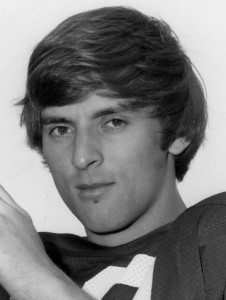 surmises that he was the 45th guy of 45 to receive a scholarship to MSU in 1971. He had three offers, all to SEC schools, but he chose MSU because he had grown up with a father who spent his own childhood in Corinth and loved to tune to Jack Cristil’s broadcasts of the Bulldog games. “Babe” frequently took his sons to see State play, and Rockey decided early on that he would spend his college career at MSU. From his very first trip to campus, it just felt like home.
surmises that he was the 45th guy of 45 to receive a scholarship to MSU in 1971. He had three offers, all to SEC schools, but he chose MSU because he had grown up with a father who spent his own childhood in Corinth and loved to tune to Jack Cristil’s broadcasts of the Bulldog games. “Babe” frequently took his sons to see State play, and Rockey decided early on that he would spend his college career at MSU. From his very first trip to campus, it just felt like home.
He never regretted it. His senior year at State brought a winning record, a bowl victory, and awards. But the most significant event of 1974 did not involve football. He met Susan Tingle of Philadelphia, Mississippi. Their 40-year relationship did not start with romance. It began with Rockey seeking Susan’s assistance to help him win the favor of her roommate. He eventually realized he was chasing the wrong girl!
The Gypsy Life of Collegiate Coaching
Things were looking serious between the two by the time graduation rolled around. Rockey was considering his future. He had majored in general business—halfheartedly—admitting that he spent many a class time drawing X’s and O’s instead of pursuing the principles of business. His heart was in coaching, and that is really all he wanted to do.
When then MSU Coach Bob Tyler offered him an assistant’s position, he knew if he took it, he was embarking on a definite career path. Rockey wrote Susan a letter telling her how much he wanted to coach but asking her if she would be ready for that kind of lifestyle if she married him.
Starry-eyed and in love with Rockey, she had no real understanding of what that meant when she said, “Of course!” She would find out soon enough.
A few years later as the young couple left Starkville for a coaching stint at Texas Tech in Lubbock, Susan remembers thinking, “What in the world is this? West Texas was flat—flatter than the Mississippi Delta—with no trees in sight. It was not Southern! But even in that move, God was so good. It was a great place for us. It forced us as a young couple to be away and on our own and we got into a church and really fell in love with Lubbock.” But then, Lubbock was home for just two years before the moving van arrived again.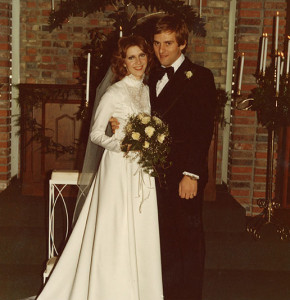
In their 37-year marriage, the Felkers have set up housekeeping in 10 different residences in six states. In the first decade alone there was Starkville, Lubbock, Memphis, Tuscaloosa, and then back to Starkville as Head Coach. The brutal reality of a coach’s job security is this—it’s all about the scoreboard. Rockey had known that from the get-go, but that did not mean it hurt any less when he was fired. It was a bitter pill for someone who was just 37 years old.
From Starkville to Tulsa to Arkansas, back to Tulsa, and then leaving coaching entirely to take up selling insurance in Fayetteville for a few years, there was a lot of bouncing around for the family. Selling insurance was—well, not fun. In a word, Rockey describes it as “horrible.”
Life may have looked chaotic on the outside, but, as a couple, they leaned hard on God in every circumstance, and their family was probably all the stronger and all the closer because of the moves. Rockey says, “We always looked at the job like God was in the middle of it. Whether we chose to leave ourselves or whether we got fired, God was causing this to happen and we are moving for a reason. Every move that we made, we always prayed about it and always tried to get a sense of conviction of ‘does God want us to stay or want us to move?’ And we’ve always grown from it.”
Looking back Rockey says, “It’s been in the hurtful things and in times that we have absolutely been on our face before the Lord that we have grown the most.”
Susan agrees. She also admits that she cried alligator tears every time she had to leave a place she had grown to love and start again in a new community where she knew no one. But she did it, and she did it well. Every place they have lived, they have made the kind of lifelong friends who remain close to them despite the miles that separate.
Counting Blessings
With the wisdom that comes in hindsight, Rockey counts the blessings that grew out of that grievous disappointment in 1990. “I wouldn’t take anything for the time I had with my kids. And I couldn’t have done that if I had been the head coach.”
Those years between their departure and return to MSU were filled with raising three sons. Not being head coach meant there was time for coaching little league, being heavily involved in church and community, and the freedom of being anonymous. Susan says, “It was great to take the kids out to eat and nobody would stop us and ask us who we were going to sign for quarterback. It was nice for a change!”
Rockey agrees. “Those years while the boys were growing up, going through junior high and high school, involved in sports and involved in the church really was a time of setting their values and becoming who they were to become. It worked out, couldn’t have worked out any better to be honest. You know, God was obviously with us.” Indeed.
The Felker boys are, in Rockey’s mind, by God’s grace, his and Susan’s greatest achievement. Jay Felker is the Young Adult Pastor at McKinney Bible Church in Fort Worth. David is Minister of Young Adults at First Presbyterian Church in Jackson, and Stephen is completing a degree from Union University that will equip him for teaching in urban communities where poverty and every sort of dysfunction are rampant.
“Every time we hear them speak, they make us cry and laugh, and, you know, put a lot of joy in both our hearts.” Some things transcend fame and fortune, and fatherhood is one of those things for Rockey Felker.
Today’s Journey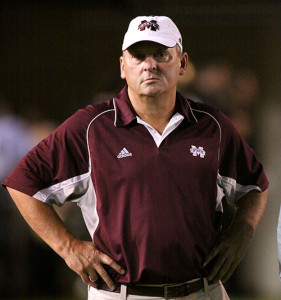
Twelve years in one place has been like living in the Promised Land for Rockey and Susan. While Rockey has enjoyed the multiple
roles he plays in athletics and in representing MSU, Susan has enjoyed not packing up boxes for the next move! Life has been rich with family, new friends, old friends, three new daughters-in-law, grandchildren, church, and a predictable life. That is, until April 2013.
Susan received the jolting diagnosis of Ovarian Cancer.
And in this illness, true to their form and faith, they lean on God and say, as always, “God has been so good to us.”
Lessons? Oh, yes, more lessons. As if they had not already earned their Ph.D. in Faithfully Following Christ. That’s the thing about God. There is just always more.
“I’ve learned,” says Susan, “to cherish moments and to try to find joy in every day. I appreciate my family and the times we’re together in a different way than I ever have before. And I realize that okay, Lord, this is what you have for me, and so how can I give you glory in this place and make it better for my family? That’s the hard thing. I have to remind myself—Lord, if you’re sovereign and this is what you have for me, then this is what you have for them, and I’m going to trust them to you as they get okay with this, too.”
Rockey says he certainly wasn’t ready to hear that “C” word, but he has discovered that there is really nothing he won’t do to support his soul mate. He echoes Susan’s feelings about cherishing the moments with each other and with their family.
Another realization for both of them has been an overwhelming gratitude for the relationships they have built in the many places they have lived. Some of those old friends from Oklahoma and Arkansas have been key supports and cheerleaders during the past year traveling to Mississippi to simply “be there” for their friends.
As Susan said recently, “Cancer clarifies. It has helped me realize what really matters—relationships with my God, my family, my friends, and each and every soul that I come into contact with. What once I might have thought of as random, is now very important to me.” She sees everything as part of God’s design.
Susan keeps a Caring Bridge page that has had around 30,000 visitors, and, as you would expect, it is a journal filled with insights, praise, and inspiration—a virtual testament to the faithfulness of the God she loves. Her entries are addressed to “Dear Ones,” and close with the words, “Redeemed, Susan.”
She compares their nomadic coaching career to a quilt saying, “This isn’t the way I had planned for it to be. I wanted to always be maroon and white, for life to be like a maroon coverlet. Instead, we ended up with a patchwork quilt of many colors! But God was so good to lead us exactly the way He did.”
And Rockey nods in agreement. “It’s all been good.”
